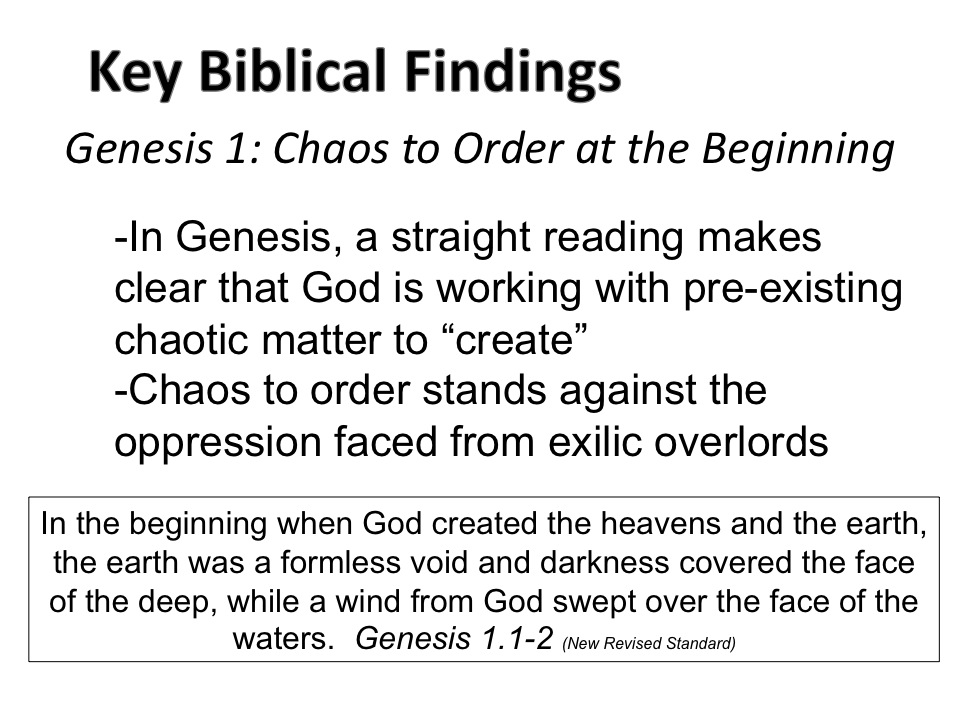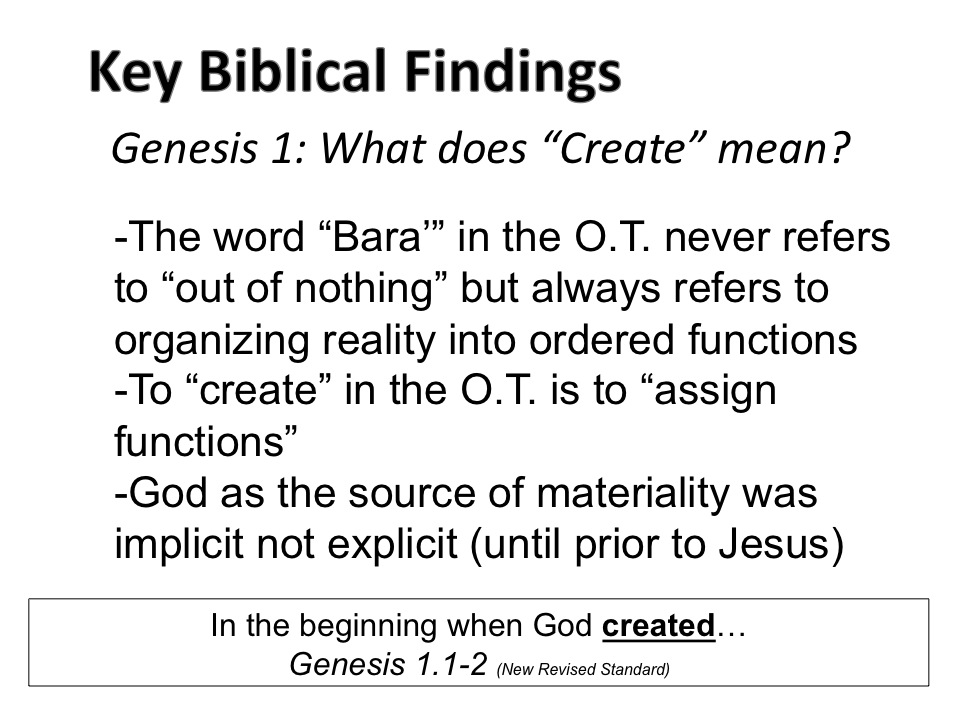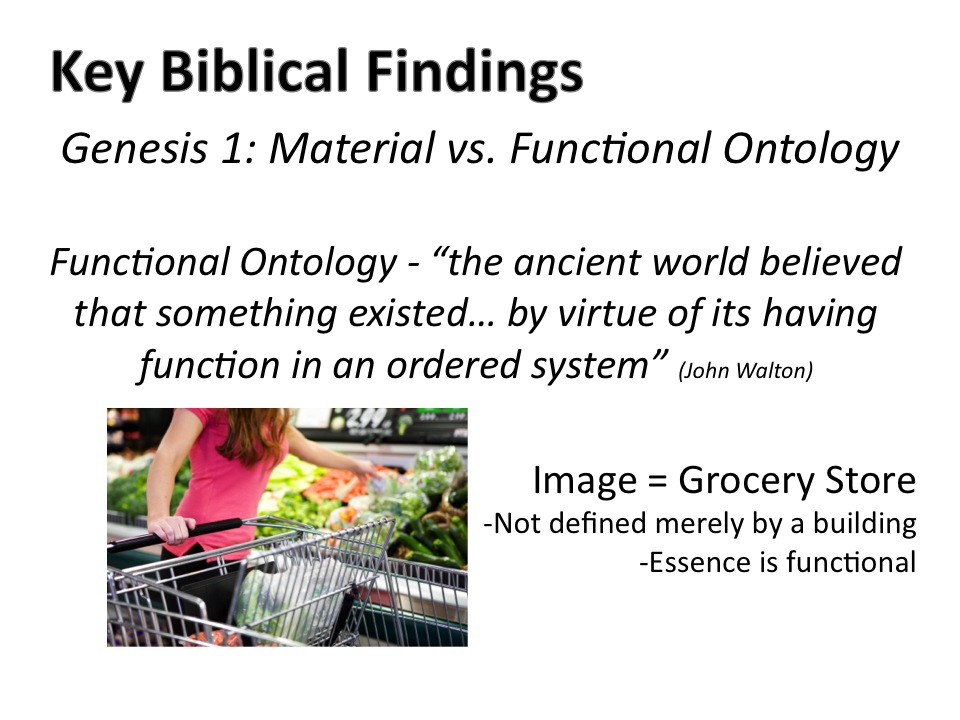The following series is based on my senior paper for Seminary. You may remember a video where I invited people to contribute their stories to help make my case. For the next couple weeks, I’ve decided to share my findings with you all. There will be a “thesis/problem” section, a “biblical theology” section, and an “application” section. I hope you will read along and share this with others! You can read the rest of the series here.
—————————————————————————————
Chaos, Creation, and the Beginning
Verse two contains a counter-intuitive claim: God created by bringing order to pre-existing chaos. According to the NIV, the world was “formless and empty” at creation. This description should not be confused with physical nothingness, but “refers to the earth as ‘void/empty’ in the sense of something desolate and unproductive.”[1] The historical despair of Israel being expelled from their land parallels the chaos that must again be tamed by God. Only a fresh creative act enables the restoration of the people of God. For Israel in exile, they appealed to the ultimate beginning of the world, from chaos to order, as a way of speaking to the need for stability in the midst of disarray.
For many evangelicals, the phrase “In the beginning God created…” does not evoke the contextual reality of exile experienced by the ancient people of God. Instead this verse regularly leads to a disregard for evolution. Some might say: If God created “in the beginning,” what else is there to discuss? I say, there is much to discuss! To start, we must discern the beginning to which the writer is referring. For much of Christian history, the church assumed an original beginning and an ex nihilo (out of nothing) creation.
One helpful perspective is that the opening phrase, specifically the word beginning (Re’shiyth), “does not refer to the absolute beginning of all things, but to the beginning of ordered creation.”[2] The chapter communicates “a relative beginning” after the pre-Genesis world of chaos.[3] This is radically different from the gap theory (the view that there is a significant time-lapse between Genesis 1.1 and 1.2). There is no gap in this text; rather pre-historic matter or chaos is assumed preexist at creation. More will be discussed on that point in a moment.
Evangelical scholar John Walton provides a related, but slightly nuanced, perspective. Walton persuasively demonstrates that the word “beginning” is used to introduce “a period in time, rather than a point in time.”[4] Therefore, it is evident that, “verse 1 serves as a literary introduction to the rest of the chapter.”[5] Throughout the rest of Genesis is a phrase: “this is the account of,” which introduces the eleven sections of the book that follow, beginning with verse 2.4. Therefore, verse 1.1 uses beginning to introduce the initial period outlined in the whole of the book of Genesis. The following eleven sections are also introduced by the above phrase. Consider Walton’s proposed translation of the first verse in the Bible: “In the initial period, God created by assigning functions throughout the heavens and the earth, and this is how he did it.”[6]
Functional Ontology
The above translation assumes God created by assigning functions. Bara’, the word English Bibles translate “created,” only refers to God’s own activity in the Old Testament. Up until the time just prior to Jesus (2 Maccabees 7.28), bara’ never implied a creation out of nothing. Rather, it was understood as the bringing of order to the world.[7] One source argues for the traditional meaning of the word arguing that its “primary emphasis… is on the newness of the created object.” However, Laird-Harris concedes that such a “concept is not necessarily inherent within the meaning of the word.”[8] We might avoid the tendency to hold onto the ex nihilo perspective if we scrutinize our presuppositions as moderns compared to that of the Ancient Near East. Bara’ occurs 50 times in the Hebrew Bible and never refers to “physical manufacturing” but rather to “assigning roles” or functions in various contexts.[9]
This assigning of functions out of pre-existing chaos, again, demonstrates God’s all-powerfulness in direct confrontation to the gods of Mesopotamia.[10] This should not be taken to say that God is not also the source of materiality; this particular text does not attempt to make the same point that moderns often do in interpretations. Exilic Jews certainly would have affirmed God as the source of material origins, but their questions focused on the functional realities of the cosmos. Eventually, the New Testament states that God created out of nothing (Rom. 4.17, Heb. 11.3), but that was a relatively new claim.[11] The Old Testament never makes this claim.
Moderns hold to a view of existence called material ontology,[12] “the belief that something exists by virtue of its physical properties and its ability to be experienced by the senses.”[13] In contrast, ancients held to what is called functional ontology, “the ancient world believed that something existed… by virtue of its having function in an ordered system.”[14]
Imagine that a grocery store is going to be constructed down the street from your home. Perhaps you notice a foundation being laid or the walls going up. Later, you see a sign on the building that says “Whole Foods.” Is this now a grocery store or simply a building? It does not function as a grocery store, so perhaps at this point, it is merely an empty building with the potential to become something more useful. It will finally become a grocery store when the employees are in place to make the building function so that it is stocked with food and ready for customers. This sort of ordering is comparable to a functional view of reality. Walton explains:
In this sort of functional ontology, the sun does not exist by virtue of its material properties, or even by its function as a burning ball of gas. Rather it exists by virtue of the role that it has in its sphere of existence, particularly in the way that it functions for humankind and human society… In a functional ontology, to bring something into existence would require giving it a function or a role in an ordered system, rather than giving it material properties. Consequently, something could be manufactured physically but still not “exist” if it has not become functional.[15]
Genesis 1 is not concerned with material origins, but with functional origins. Genesis 1 is about God taking unorganized preexistent materials (which also originated in God) and organizing them into their various functions.[16]
[1]. Fretheim, The New Interpreter’s Bible: A Commentary in Twelve Volumes – Volume I, 342.
[2]. Fretheim, The New Interpreter’s Bible: A Commentary in Twelve Volumes – Volume I, 342.
[3]. Waltke, Genesis: A Commentary, 58-59 and n. 12.
[4]. Walton, The Lost World of Genesis One: Ancient Cosmology and the Origins Debate, 45.
[5]. Ibid.
[6]. Ibid., 46.
[7]. Theodore Hiebert, “Create, To,” in The New Interpreter’s Dictionary of the Bible: A-C, ed. Katharine Doob Sakenfeld (Nashville, TN: Abingdon Press, 2006-2009), 1:779-80.
[8]. R. Laird Harris et al., eds., “278,” in Theological Wordbook of the Old Testament (Chicago: Moody Press, 1980), 1:127.
[9]. John H. Walton, “Creation,” in Dictionary of the Old Testament: Pentateuch, ed. David Baker and T. Desmond Alexander (Downers Grove: InterVarsity Press, 2003), 161.
[10]. Ibid., 163.
[11]. Brueggemann, Genesis, 29.
[12]. Ontology is a particular theory about the nature of being or the kinds of things that have existence. Merriam-Webster, I. (2003). Merriam-Webster’s collegiate dictionary. (Eleventh ed.). Springfield, Mass.: Merriam-Webster, Inc.
[13]. Walton, The Lost World of Genesis One: Ancient Cosmology and the Origins Debate, 24.
[14]. Ibid., 26.
[15]. Ibid.
[16]. Ibid., 45.














